
INFLAMMATION
Scope & Guideline
Pioneering Insights into Inflammatory Processes
Introduction
Aims and Scopes
- Pathophysiology of Inflammation:
Research articles delve into the cellular and molecular mechanisms that drive inflammatory responses in various contexts, including autoimmune diseases, infections, and chronic inflammatory conditions. - Immune Cell Dynamics:
The journal frequently publishes studies on the role of different immune cell populations, such as macrophages, T cells, and B cells, in mediating inflammation and their interactions in tissue responses. - Therapeutic Approaches:
Papers often focus on novel therapeutic strategies aimed at modulating inflammatory pathways, including the use of biologics, small molecules, and natural compounds to alleviate inflammation. - Clinical Implications of Inflammation:
Research highlights the clinical relevance of inflammation in disease progression, diagnosis, and treatment, emphasizing the importance of inflammatory biomarkers in patient management. - Microbiome and Inflammation:
There is a growing interest in the relationship between the microbiome and inflammation, exploring how microbial communities can influence immune responses and inflammatory diseases.
Trending and Emerging
- Role of the Gut Microbiome in Inflammation:
Recent studies emphasize the connection between gut microbiota and inflammatory responses, exploring how microbial composition affects immune system function and inflammation-related diseases. - Inflammasome Activation and Pyroptosis:
There is a surge in research focusing on inflammasome pathways and the process of pyroptosis, highlighting their roles in various inflammatory diseases and potential therapeutic targets. - Neuroinflammation and Neurological Disorders:
Emerging research emphasizes the significance of neuroinflammation in conditions such as Alzheimer’s disease and multiple sclerosis, indicating a growing interest in the intersection of inflammation and neurobiology. - Metabolism and Inflammation:
The interplay between metabolic processes and inflammation is a rising theme, with studies investigating how metabolic dysregulation contributes to chronic inflammatory states and diseases. - Targeted Immunotherapy Approaches:
Innovative approaches to immunotherapy, including the modulation of immune checkpoints and personalized medicine strategies, are increasingly prominent in the journal's recent publications.
Declining or Waning
- Traditional Anti-inflammatory Agents:
Research on conventional anti-inflammatory medications, such as non-steroidal anti-inflammatory drugs (NSAIDs), has decreased as the field moves towards exploring more targeted and innovative therapeutic approaches. - Single-Pathway Studies:
There is a noticeable decline in studies that focus solely on single inflammatory pathways without considering the broader context of systemic inflammation and immune interactions. - In Vitro Models:
While in vitro studies remain important, there has been a shift towards more complex in vivo models that better represent the physiological conditions of inflammatory diseases. - Generalized Inflammatory Biomarkers:
Research focusing on broad inflammatory markers without specificity to disease contexts is becoming less common, as studies increasingly target more precise biomarkers linked to specific inflammatory pathways.
Similar Journals
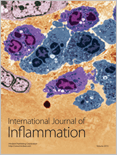
International Journal of Inflammation
Advancing the Frontiers of Inflammation ResearchThe International Journal of Inflammation, published by HINDAWI LTD, serves as a vital resource within the field of Immunology and Allergy. With an established Open Access policy since 2010, this journal provides unrestricted access to cutting-edge research, fostering collaboration and dissemination of knowledge among researchers, professionals, and students. The journal’s ISSN is 2090-8040 and E-ISSN 2042-0099. Situated in the United States with administrative offices in England, it has consistently contributed to the academic community, evidenced by its ranking in the Q3 category for 2023, reflecting its significant presence in the field. Covering a wide range of topics from the molecular basis of inflammation to clinical implications and treatment strategies, the journal engages with the latest developments and current debates. With a Scopus rank of 145 out of 233 in the category of Medicine, its percentile rank of 37th indicates its influence and relevance in contemporary research. As the journal continues to evolve from its convergence years spanning from 2012 to 2024, it remains committed to advancing knowledge and innovation in inflammation research.
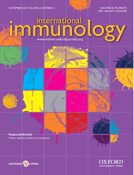
INTERNATIONAL IMMUNOLOGY
Leading the Charge in Immunological Discoveries and Developments.INTERNATIONAL IMMUNOLOGY, published by OXFORD UNIV PRESS, stands out as a premier journal in the field of immunology, providing a vital platform for disseminating groundbreaking research and innovative developments within the discipline. With an impressive Q1 ranking in Immunology and Allergy, as well as in Medicine (miscellaneous), it consistently showcases high-impact studies that contribute to the advancement of immunological knowledge. The journal spans over three decades, from its inception in 1989 to its ongoing contributions as of 2024, thus solidifying its reputation in the scientific community. Researchers, professionals, and students will find valuable articles that delve into the complexities of immune responses, therapeutic interventions, and emerging immunological paradigms, ensuring INTERNATIONAL IMMUNOLOGY remains at the forefront of knowledge in the life sciences.
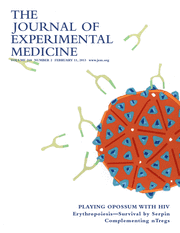
JOURNAL OF EXPERIMENTAL MEDICINE
Fostering Collaboration for Groundbreaking ResearchJOURNAL OF EXPERIMENTAL MEDICINE, published by Rockefeller University Press, is a renowned peer-reviewed journal dedicated to advancing the field of experimental medicine since its inception in 1896. With an impressive impact factor and categorized in the Q1 quartile for Immunology, Immunology and Allergy, and Miscellaneous Medicine, this journal stands at the forefront of medical research and innovation. It provides a prestigious platform for scholars and practitioners to disseminate groundbreaking findings that drive the understanding of disease mechanisms and therapeutic strategies. While the journal is not open access, it maintains high visibility and engagement within the scientific community, fostering collaboration among researchers, professionals, and students alike. The journal's consistent ranking in the top percentiles of Scopus illustrates its significant impact and commitment to excellence in medical research.

Immuno
Shaping the Future of Immunology with Every PublicationWelcome to Immuno, a pioneering open-access journal published by MDPI that serves as a key platform for the dissemination of innovative research in the fields of immunology, biochemistry, and genetics. Established in 2021, this journal has rapidly established itself within the academic community, currently ranking in the 53rd percentile in Medicine (miscellaneous) and 50th percentile in Biochemistry, Genetics, and Molecular Biology according to Scopus metrics. With a commitment to advancing our understanding of immune mechanisms and their applications in health and disease, Immuno is dedicated to publishing high-quality peer-reviewed articles that contribute valuable insights to both researchers and practitioners. Positioned in the heart of Switzerland, its global accessibility and diverse editorial board are a testament to its aim to promote knowledge exchange among scientists, practitioners, and students alike. Explore the latest discoveries and advancements in immunological research through Immuno, where your contributions help shape the future of this critical area of study.
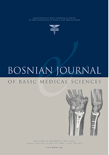
Bosnian Journal of Basic Medical Sciences
Pioneering Discoveries in Basic Medical SciencesThe Bosnian Journal of Basic Medical Sciences, an esteemed publication within the field of medicine, serves as a pivotal platform for disseminating high-quality research and innovative findings since its inception in 2003. Published by the Association of Basic Medical Science Federation of Bosnia and Herzegovina, this open-access journal makes substantial contributions to the medical sciences, fostering collaboration and knowledge sharing among researchers, healthcare professionals, and students alike. With a distinguished Q2 ranking in Medicine (Miscellaneous) for 2023 and a remarkable 91st percentile Scopus rank in General Medicine, the journal emphasizes its commitment to excellence and relevance in contemporary medical research. It operates out of Sarajevo, Bosnia and Herzegovina, continuing to attract diverse contributions from a global audience and solidifying its role in advancing basic medical science. The journal's broad scope, covering innovative and diverse medical topics, promotes interdisciplinary approaches that are essential in addressing today's health challenges.
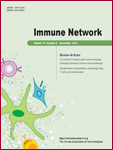
Immune Network
Exploring the Frontiers of Immunity and DiseaseImmune Network is a prestigious journal dedicated to disseminating high-quality research in the field of immunology, infectious diseases, and allergy, under the esteemed KOREA ASSOCIATION OF IMMUNOLOGISTS. Founded in 2016, this journal has quickly ascended to a top-tier publication, achieving Q1 rankings in 2023 in multiple relevant categories, including Immunology, Allergy, and Infectious Diseases. With a strong emphasis on innovation and interdisciplinary research, Immune Network appeals to a diverse audience of researchers, professionals, and students keen on advancing the understanding of immune responses and disease mechanisms. However, it is crucial to note that the journal operates under a subscription model without open-access provisions. Its impact factor further solidifies its reputation, reflecting the significant influence of the articles published. Located in South Korea, the journal serves as a global platform for sharing revolutionary insights and fostering collaborations within the immunology community.

Inflammation and Regeneration
Empowering discoveries in inflammation and regenerative therapies.Inflammation and Regeneration is a prominent open-access journal published by BMC, focused on the discerning fields of immunology, cell biology, and regenerative medicine. Since its establishment in 2016, the journal has provided a platform for the dissemination of high-quality research, contributing significantly to the advancement of knowledge in inflammation processes and regenerative therapies. With a remarkable impact reflected in its Q1 quartile rankings in Cell Biology and Immunology for 2023, Inflammation and Regeneration stands out as a leading resource for researchers and practitioners. The journal's commitment to open access ensures that critical findings are readily available to a global audience, fostering collaboration and innovation in the scientific community. With a Scopus ranking that places it in the top 20% of its categories, Inflammation and Regeneration serves as an essential reference for those seeking to stay at the forefront of immunological research and its applications.
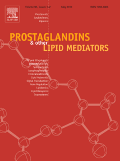
PROSTAGLANDINS & OTHER LIPID MEDIATORS
Pioneering Research in Biochemistry and PharmacologyPROSTAGLANDINS & OTHER LIPID MEDIATORS, published by Elsevier Science Inc, is a leading journal dedicated to the advancements in the field of lipid mediators, with a specific focus on prostaglandins and other bioactive lipids. This journal, indexed under ISSN 1098-8823 and E-ISSN 2212-196X, serves as a crucial platform for researchers and professionals to disseminate significant findings that span multiple disciplines, including Biochemistry, Cell Biology, Pharmacology, and Physiology. In the 2023 category quartiles, it has achieved commendable positions such as Q2 in Biochemistry and Q2 in Physiology, underscoring its importance and influence in these domains. Although it is not an open-access journal, it provides robust access options, enhancing the visibility of vital research. With its establishment in 1996, the journal continues its commitment to fostering innovative research until 2024, making it an essential resource for those involved in the dynamic realms of lipid biology and medical research.
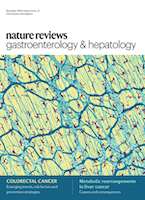
Nature Reviews Gastroenterology & Hepatology
Transforming Research into Clinical PracticeNature Reviews Gastroenterology & Hepatology is a premier academic journal published by NATURE PORTFOLIO, specializing in the vital fields of gastroenterology and hepatology. With an impressive impact factor and categorized in Q1 for both disciplines, this journal ranks at the top of its field, with Scopus rankings placing it in the 99th percentile for gastroenterology and hepatology. The journal aims to provide critical reviews that synthesize the latest research findings, clinical practices, and breakthroughs, catering to researchers, healthcare professionals, and students alike. With its wide-ranging access options, it promotes the dissemination of knowledge essential for advancements in understanding digestive and liver disorders. The journal has been committed to academic excellence since its convergence in 2009, continuing to shape the future of gastroenterological and hepatological research through rigorous peer-reviewed content.

Journal of Ophthalmic Inflammation and Infection
Bridging knowledge gaps in ophthalmology and infectious diseases.The Journal of Ophthalmic Inflammation and Infection, published by SPRINGER since 2011, stands as a pivotal resource for professionals in the fields of ophthalmology and infectious diseases. With an impactful Q2 ranking in both categories as of 2023, this open access journal is dedicated to disseminating high-quality research and reviews related to ocular inflammation and its infectious causes, fostering a deeper understanding of these critical health issues. The journal is well-regarded in the academic community, currently positioned at Rank #43 in Ophthalmology, reflecting its significance and influence within the discipline. The journal is accessible globally from its base in Germany, offering valuable insights to researchers, healthcare professionals, and students alike. With a commitment to excellence in publishing through 2024 and beyond, this journal continues to contribute meaningfully to innovative studies and clinical practices in ocular health.